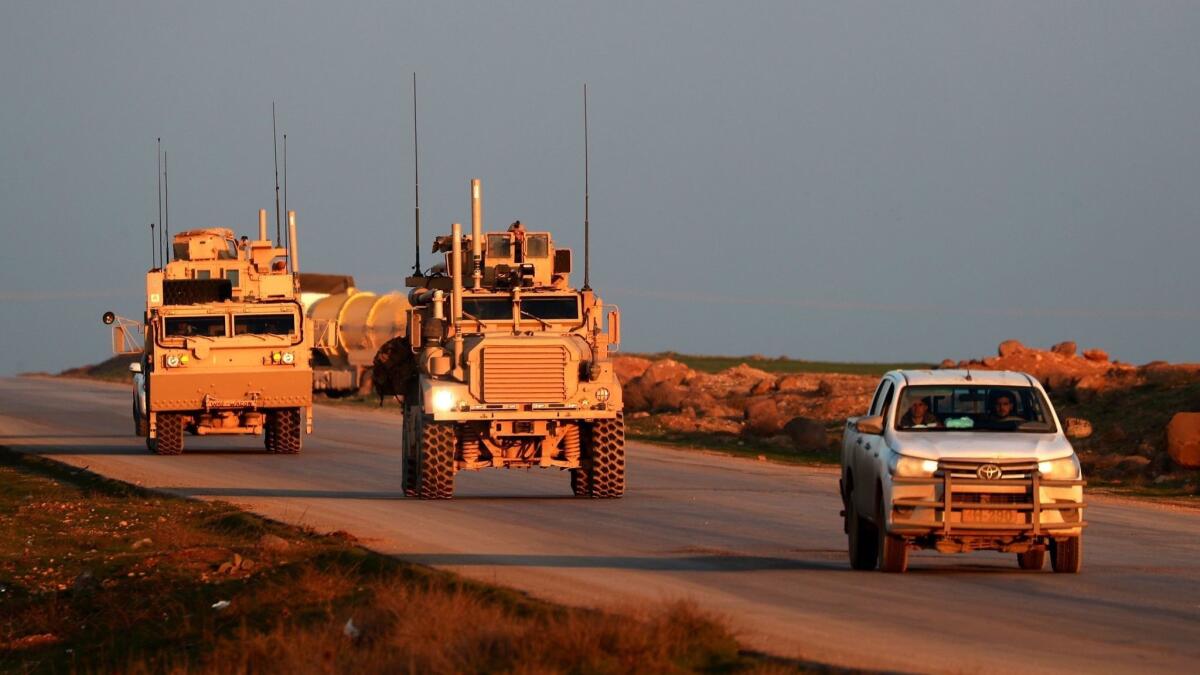U.S.-backed militia captures two American militants in battle with Islamic State in Syria

- Share via
Reporting from Baghdad — “Dear Director, I am looking to get a position teaching English to students in the Islamic State.”
So began Warren Christopher Clark, a substitute teacher from Texas, in a cover letter written sometime after 2014 and later obtained by American researchers studying extremism.
Clark wound up joining the extremist group in Mosul, Iraq, under the nom de guerre Abu Muhammad Ameriki — “The father of Muhammad the American.”
On Sunday, a U.S.-backed militia known as the Syrian Democratic Forces announced that it had captured Clark along with another American, an Irishman and two Pakistanis inside Syria.
“A group of terrorists, who had been preparing to attack the civilians who were trying to get out of the war zone in masses, was detected,” the Kurdish-dominated militia said in a statement. “Following long-term technical and physical follow-up, an operation against the cell was carried out by our forces.”
Activists said the five had been caught near Kashmah, a small Syrian hamlet in the eastern province of Dair Alzour.
The area, a small pocket of desert between the Euphrates River and the border with Iraq, is one of the last redoubts of Islamic State militants. For months, the militia has battled the jihadis for control there.
Clark, 34, converted to Islam in 2004, according to local news reports. He graduated in 2008 from the University of Houston with a bachelor’s degree in political science and a minor in global business, then worked as a substitute teacher in Texas before teaching English in Saudi Arabia and Turkey.
According to his cover letter, he considered “working at the University of Mosul to be a great way of continuing my career.”
“As my resume shows, I have a variety of skills as well as work experience in education, which I believe will make me an excellent English teacher,” the letter continues. “Please feel free to contact me at your convenience. Thank you for taking the time to consider me.”
The cover letter was found in a Mosul home after the Iraqi government regained control of the city in 2017 — three years after the militants seized it and a large swath of Iraq and Syria — and was published by the Program on Extremism at George Washington University in a lengthy report last year on 64 Americans who had joined Islamic State.
Little information was immediately available about the other American captive, 35-year-old Ziad Abed Hamid.
If sent back to the U.S., he and Clark would be the 15th and 16th Americans known to have returned home after joining Islamic State, according to Seamus Hughes, the deputy director of the George Washington program.
Though Clark had applied to be an English teacher, it is unclear whether that was his job for the terrorist group. In any case, he is likely to face terrorism charges if prosecuted in the U.S.
The average prison sentence for the militants sent back to the U.S. is 10 years, according to the report on the returnees.
Some received reduced sentences in exchange for information on the group. One former Islamic State member, who at one point had attended Columbia University in New York, avoided prison time by cooperating with prosecutors and providing them Islamic State documents.
Compared with recruits from Europe and the Middle East, Americans make up a tiny part of Islamic State’s foreign contingent, according to the report. Most appeared to have made contact with Islamic State online and not through entrenched networks like those found in Europe, it said.
The foreigners’ capture comes as the Trump administration continues sending mixed signals on a timetable for its withdrawal of about 2,000 U.S. troops from Syria.
On Sunday, when reporters asked President Trump how long the pullout would take, he replied: “It’s going quickly.”
Meanwhile, national security advisor John Bolton said during a briefing with reporters in Israel that there are objectives that “condition the withdrawal.”
One of those conditions is that Turkey not attack the Kurds, who since 2015 have become the local spearhead for the U.S. in the fight against Islamic State.
But Turkey, a North Atlantic Treaty Organization ally, considers the Kurdish contingent of the Syrian Democratic Forces to be a proxy for its homegrown Kurdish insurgency and has long clamored for the U.S. to end its support for the group.
Twitter: @nabihbulos
More to Read
Sign up for Essential California
The most important California stories and recommendations in your inbox every morning.
You may occasionally receive promotional content from the Los Angeles Times.











